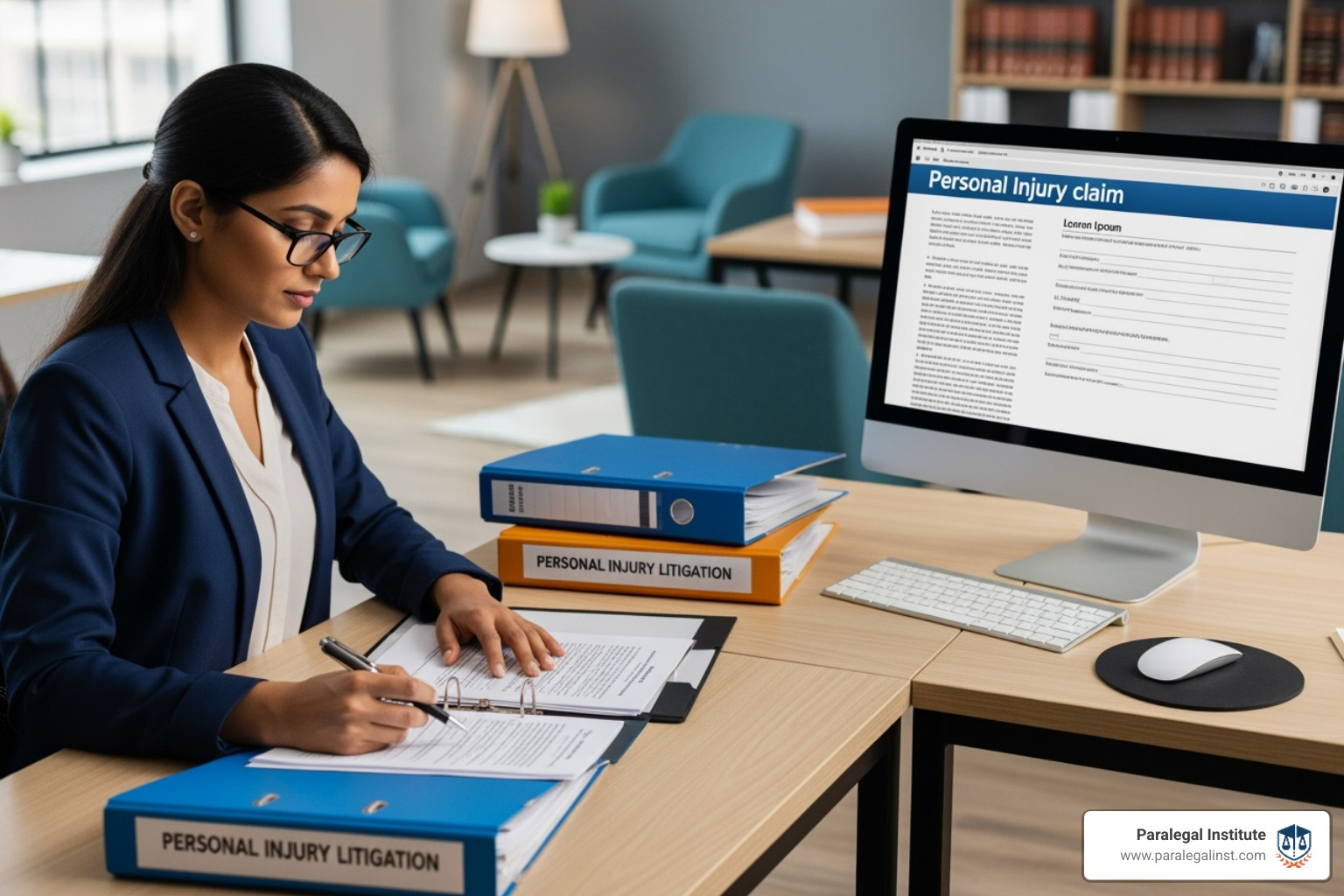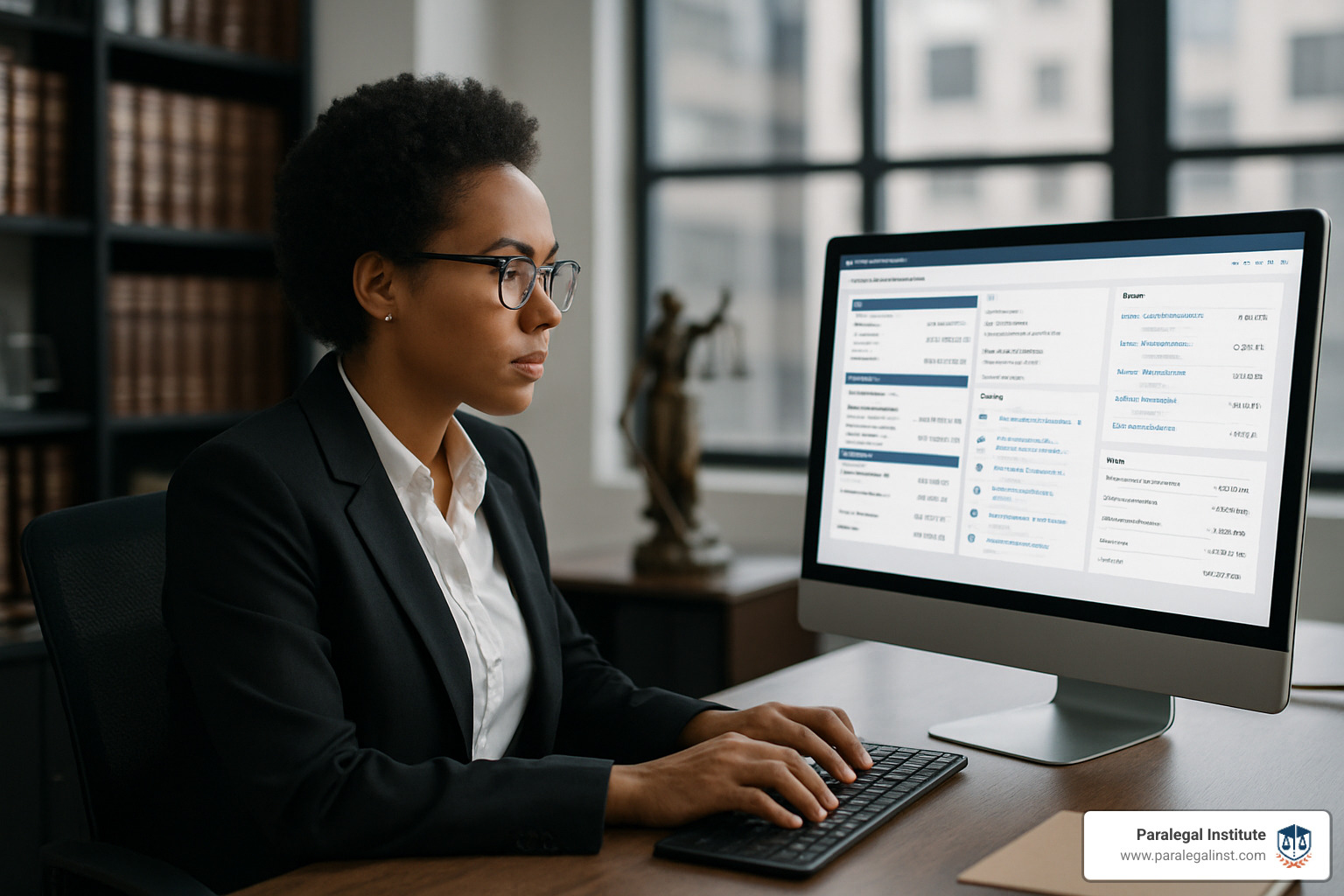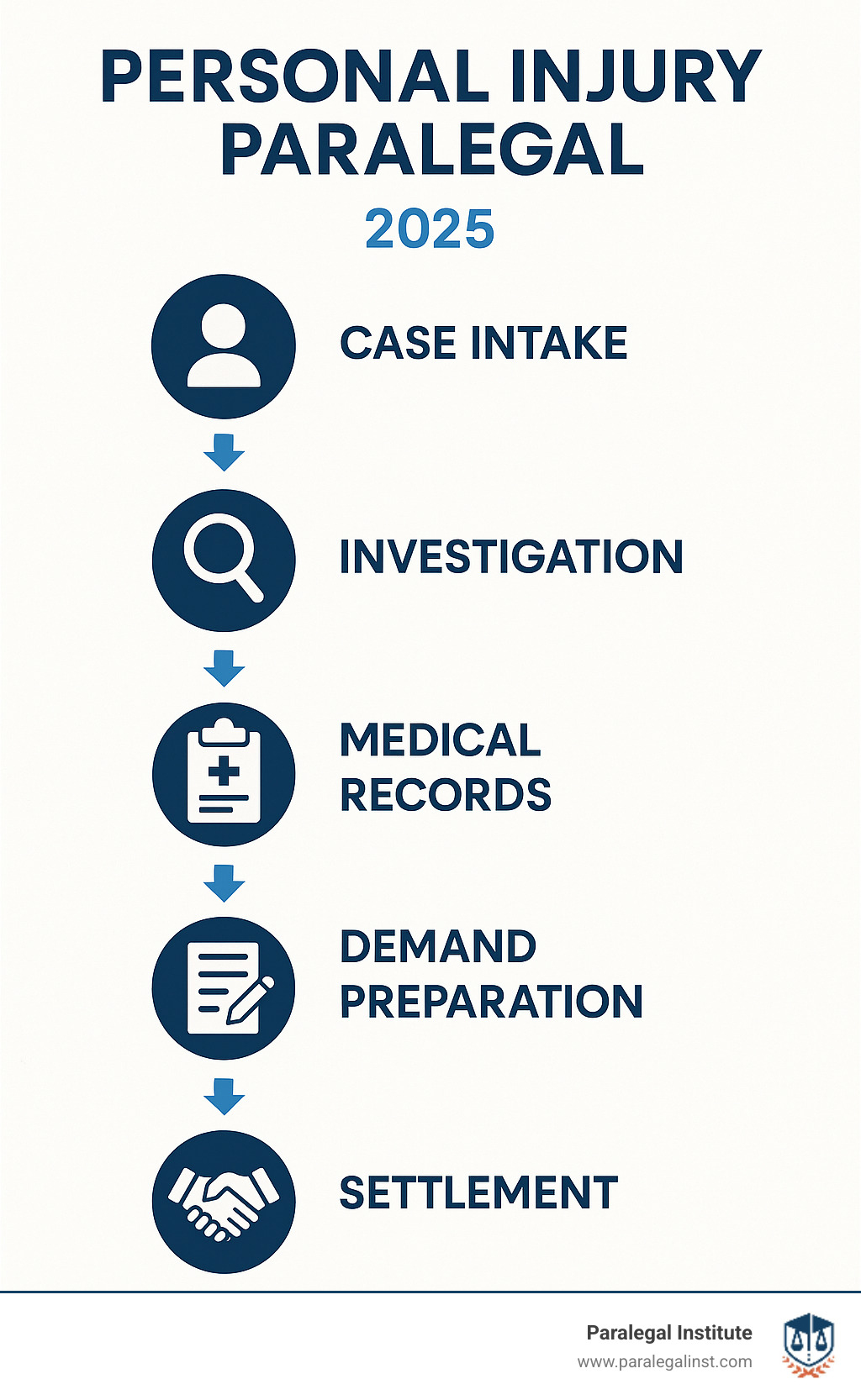Personal Injury Paralegal 101
Why Personal Injury Paralegals Are Essential to Legal Success
A personal injury paralegal is a trained legal professional who assists attorneys in managing cases involving accidents, injuries, and negligence claims. These paralegals handle everything from client intake and medical record collection to trial preparation and settlement negotiations.
Quick Overview: Personal Injury Paralegal Essentials
- Primary Role: Support attorneys in tort law cases from intake through resolution
- Key Skills: Medical terminology, legal research, client communication, case management
- Daily Tasks: Document organization, deadline tracking, client interviews, evidence gathering
- Work Environment: Law firms, insurance companies, corporate legal departments
- Education Path: Paralegal certificate program
Personal injury paralegals often manage upwards of 100 case files simultaneously, making them the backbone of successful personal injury law firms. They bridge the gap between complex legal procedures and compassionate client care, ensuring no critical deadlines are missed while helping injured clients steer the legal system.
I'm Matthew Pfau, and I've spent years hiring and training personal injury paralegals in my law firm before founding Paralegal Institute. My experience managing numerous jury trials and working with paralegals daily inspired me to create comprehensive training programs that prepare aspiring professionals for real-world success in personal injury law.

Understanding the Role of a Personal Injury Paralegal
When someone gets hurt in a car accident or slips and falls at a store, they often don't realize how complex their legal case will become. That's where personal injury paralegals step in as the unsung heroes of the legal world, managing the intricate details that can make or break a client's claim.
Personal injury law falls under tort law, which covers cases where someone gets hurt because of another person's carelessness. Every personal injury case needs to prove four things: the other person had a duty to be careful, they broke that duty, their actions caused the injury, and real damages occurred.
What Is a Personal Injury Paralegal?
A personal injury paralegal combines legal knowledge with medical understanding to support attorneys in handling injury claims. Unlike paralegals who work in other areas of law, these professionals need to understand everything from basic human anatomy to complex medical procedures.
The emotional side of this work can't be overlooked. Personal injury paralegals often become the main point of contact for clients who are dealing with physical pain, emotional trauma, and financial stress all at once. They need to balance getting accurate information with providing genuine compassion during some of the worst times in people's lives.
For more insights into how paralegals fit into the broader legal landscape, check out our guide on the Role of Paralegals in Law Firms.
Core Responsibilities Across a Case
The life of a personal injury paralegal changes dramatically depending on where a case stands. During initial client intake, they conduct detailed interviews to gather facts and assess claim strength. Evidence gathering becomes a treasure hunt where attention to detail can make or break everything.
Medical records deserve special attention because they're protected by HIPAA privacy laws. A personal injury paralegal must understand exactly when and how to request these records, what authorizations are needed, and how to handle protected health information properly. The HIPAA authorization basics provide essential guidance for handling medical information correctly.
When cases head toward trial, the paralegal's role shifts into high gear. They organize exhibits, prepare witness lists, draft jury instructions, and coordinate with expert witnesses. Settlement negotiations require preparing demand packages that tell the client's story compellingly while calculating damages accurately.
Plaintiff vs. Defense: Key Differences
Plaintiff-side paralegals work for the injured person, focusing on building the strongest possible case. They investigate what happened, gather evidence of injuries and damages, and work to maximize settlement values. This work involves extensive client contact and emotional support.
Defense-side paralegals represent defendants and insurance companies. Their job is to minimize liability and damages by investigating alternative causes of accidents and developing defense strategies. This work tends to be more analytical and investigative, focusing on finding weaknesses in the plaintiff's case.
Essential Skills and Qualifications for Success
The most successful personal injury paralegals develop a fascinating blend of skills that bridges the gap between law and medicine. You don't need a medical degree, but you'll find yourself learning anatomy, understanding complex medical procedures, and becoming fluent in medical terminology.

Think of yourself as a detective, translator, and counselor all rolled into one. Your legal research skills help you find the statutes and case law that support your clients' cases. Your medical literacy enables you to understand what really happened when your client was injured. And your communication abilities help you explain complex legal concepts to people who are scared, hurt, and overwhelmed.
But here's what really sets exceptional paralegals apart: attention to detail. In personal injury law, missing one small detail can mean the difference between a successful settlement and a dismissed case. For deeper insights into developing this crucial skill, check out our guide on the Importance of Attention to Detail in Paralegal Work.
Building Medical Literacy Without a Med Degree
You'll be amazed at how much medical knowledge you'll absorb as a personal injury paralegal. Within months, you'll be reading medical records like a pro, understanding injury mechanisms, and explaining complex medical concepts to clients and attorneys alike.
Basic anatomy knowledge becomes your foundation. You'll learn the difference between cervical, thoracic, and lumbar spine injuries. Medical abbreviations appear everywhere in medical records. "Fx" means fracture, "dx" means diagnosis, "Rx" refers to prescriptions, and "Hx" indicates history.
For comprehensive information about medical terminology and abbreviations, the Scientific research on medical abbreviations resource provides excellent reference material.
Legal Research & Writing Tools
Legal research forms the backbone of every successful personal injury case. As a personal injury paralegal, you'll become skilled at finding relevant statutes, case law, and regulations. Understanding statute of limitations periods is particularly crucial.
Demand letter writing represents one of your most important skills. These documents present your client's case to insurance companies, outlining liability, damages, and settlement demands. Well-crafted demand letters can lead to favorable settlements without costly litigation.
Strengthen your legal research capabilities through our Legal Research Skills Training program.
Soft Skills That Set You Apart
Client empathy tops the list because you'll frequently interact with people experiencing physical pain, emotional trauma, and financial stress. Time management becomes critical when you're juggling 100+ case files simultaneously.
Problem-solving abilities help you overcome obstacles that inevitably arise in personal injury cases. Learn more about developing these crucial abilities through our guide on Strategies for Paralegals to Stay Organized.
Day-to-Day Workflow of a Personal Injury Paralegal
Every morning, a personal injury paralegal faces a unique puzzle of priorities, deadlines, and client needs. With potentially 100+ active cases demanding attention, successful paralegals develop systems that keep everything moving forward without dropping the ball.
Calendar management becomes your lifeline in this environment. You'll spend the first part of each day reviewing upcoming deadlines, court dates, and statute of limitations warnings. File management might sound boring, but it's absolutely critical when you're juggling dozens of cases.
A Typical Pre-Litigation Day
Before cases reach the courthouse, personal injury paralegals focus on building the strongest possible foundation for each claim. Your day might start with intake calls from potential new clients, where you'll gather initial information and assess whether their case fits your firm's criteria.
Medical record requests often consume large chunks of your day. You'll identify every doctor, hospital, and clinic that treated your client, then prepare HIPAA-compliant requests for their records. Demand package preparation represents the culmination of your pre-litigation work.
Inside the Litigation Phase
Once attorneys file lawsuits, your role as a personal injury paralegal shifts into a more formal, court-focused mode. Findy management dominates much of litigation work. You'll prepare interrogatories, coordinate document production requests, and organize responses to findy requests from opposing counsel.
| Findy Tool | Purpose | Timeline | Paralegal Role |
|---|---|---|---|
| Interrogatories | Written questions requiring sworn answers | 30 days to respond | Draft questions, organize responses |
| Requests for Production | Document and evidence requests | 30 days to respond | Compile documents, organize production |
| Depositions | Live sworn testimony | Scheduled by agreement | Coordinate scheduling, prepare summaries |
| Requests for Admission | Statements to admit or deny | 30 days to respond | Draft requests, analyze responses |
Deposition coordination tests your organizational skills as you juggle schedules for attorneys, witnesses, and court reporters. Court filings require attention to detail and understanding of local rules.
Client Communication & Case Updates
Effective client communication sets exceptional personal injury paralegals apart from the rest. Your clients are often dealing with physical pain, mounting medical bills, and uncertainty about their future. They need regular updates, clear explanations, and genuine empathy throughout their legal journey.
For more insights into paralegal responsibilities and career development, explore our Entry Level Paralegal Job Description.
Technology, Checklists & Best Practices
Modern personal injury paralegals rely heavily on technology to manage complex caseloads efficiently. Today's paralegals use sophisticated case management software that transforms how they track deadlines, organize documents, and communicate with clients.

The right technology stack can make the difference between a paralegal who struggles with their caseload and one who thrives. Digital tools streamline workflows and reduce human error in ways that seemed impossible just a decade ago.
The Personal Injury Paralegal Checklist
A comprehensive checklist serves as the backbone of effective personal injury practice. Personal injury paralegals who use standardized checklists ensure consistent case handling, reduce errors, and improve client satisfaction.

The intake phase requires gathering client information, conducting conflict checks, executing retainer agreements, and completing initial case assessments. Investigation and evidence gathering must be systematic to ensure nothing is overlooked. Medical records collection requires identifying all relevant healthcare providers and ensuring comprehensive record gathering.
Leveraging Software to Streamline Work
Case management software has become indispensable for personal injury paralegals managing large caseloads. Automated reminder systems prevent missed deadlines by generating alerts based on court rules and case timelines. Document templates speed up routine tasks while maintaining consistency across cases.
Client portals improve communication by providing secure access to case information. Rule-based calendaring automatically generates deadlines based on triggering events. Secure document sharing allows paralegals to collaborate while maintaining confidentiality.
Quality Control & Ethics
Maintaining high standards and ethical compliance is crucial for personal injury paralegals. HIPAA compliance requires understanding healthcare privacy regulations and proper procedures for requesting, receiving, and sharing medical information. For detailed information about HIPAA requirements, refer to the HIPAA authorization basics.
Conflict checking ensures the firm can represent clients without ethical violations. Confidentiality maintenance extends beyond HIPAA requirements to include all client communications and case strategies.
Career Path: Earning Your Paralegal Certificate & Beyond
The path to becoming a personal injury paralegal begins with proper education and training. While some firms may hire candidates with only high school diplomas, most prefer paralegals with formal paralegal education and specialized training.
A paralegal certificate program provides the foundational knowledge needed for success in personal injury practice. The Paralegal Institute offers a comprehensive 15-week paralegal certificate program designed specifically for aspiring personal injury paralegals.
Steps to Become a Personal Injury Paralegal
Education forms the cornerstone of paralegal preparation. A paralegal certificate program provides essential knowledge of legal principles, research methods, and professional ethics. Practical experience through internships or entry-level positions allows new paralegals to apply their education in real-world settings.
Mentorship plays a crucial role in career development. Finding experienced paralegals or attorneys willing to share their knowledge can accelerate your learning curve. Resume preparation should highlight relevant education, skills, and any practical experience.
For comprehensive information about paralegal education options, explore our Paralegal Certificate and Degree Programs.
Job Outlook & Salary Factors
Geographic location significantly impacts salary levels. Firm size and type influence compensation structures. Experience level directly correlates with earning potential. Contingency fee bonuses can supplement base salaries in personal injury firms.
Advancing Your Career
Career advancement for personal injury paralegals comes through specialization, skill development, and professional networking. Developing expertise in specific areas like medical malpractice or product liability can lead to higher compensation.
Professional networking through paralegal associations and industry events creates opportunities for career advancement. Continuing education keeps paralegals current with changing laws and new technologies.
Frequently Asked Questions about Personal Injury Paralegals
What medical knowledge does a personal injury paralegal really need?
Personal injury paralegals don't need medical degrees, but they absolutely need more medical knowledge than most people realize. The basics start with understanding human anatomy - you should know the difference between your cervical spine (neck) and lumbar spine (lower back).
Medical terminology becomes your second language. Terms like "radiculopathy" (nerve pain that radiates) and "neuropathy" (nerve damage) pop up constantly in medical records. You'll also encounter countless abbreviations - "fx" means fracture, "dx" means diagnosis.
The depth of medical knowledge you need depends on your firm's focus. Start with the fundamentals and build your knowledge through real cases.
How do personal injury paralegals prevent missed deadlines?
Missing a deadline as a personal injury paralegal can destroy valid cases and lead to malpractice claims. The secret is building multiple safety nets. Smart paralegals never rely on just one reminder system.
Case management software has revolutionized deadline tracking. These systems can automatically calculate deadlines based on court rules and case events. But technology isn't foolproof - the most successful paralegals combine digital tools with manual tracking systems.
Can a personal injury paralegal work on both plaintiff and defense cases?
Absolutely! Many personal injury paralegals work on both sides of personal injury cases. When you're working plaintiff-side, you become the injured person's advocate. Defense work takes a different approach - you're working for insurance companies or defendants trying to minimize their liability.
The skills transfer beautifully between both sides. Understanding how defense attorneys think makes you a better plaintiff paralegal, and vice versa.
Conclusion
Your journey as a personal injury paralegal starts with understanding just how vital this role is to the legal system. These skilled professionals don't just push papers around - they're the ones making sure injured clients get the justice they deserve while keeping law firms running smoothly.
As a personal injury paralegal, you become their guide through the legal maze, translating complex medical records into compelling cases and making sure no critical deadlines slip through the cracks. The Paralegal Institute's 15-week paralegal certificate program gives you everything you need to walk into a law firm and start making a difference from day one.
The skills you'll master go far beyond basic legal knowledge. You'll learn to read medical records like a detective, understand why a "C5-C6 disc herniation" matters to your client's case, and develop the empathy needed to work with people during some of the worst times in their lives.
With average salaries around $55,020 and top performers earning over $82,500, this career offers real financial stability. More importantly, you'll wake up each day knowing your work helps people rebuild their lives after accidents and injuries.
What makes this career truly special is the combination of intellectual challenge and meaningful impact. Every case is different, every client has a unique story, and every settlement you help secure makes a real difference in someone's life.
The legal profession desperately needs skilled personal injury paralegals who can handle the complexities of modern injury cases. This creates incredible opportunities for paralegals who are properly trained and ready to hit the ground running.
Ready to take that first step? Our comprehensive training program prepares you for the real world of personal injury law. For more information about legal support staff training and how to launch your career, visit our More info about legal support staff training page.
The legal system needs people like you - people who care about justice, pay attention to details, and want to make a real difference in others' lives. With the right training and dedication, you can build a rewarding career as a personal injury paralegal while helping injured clients get the compensation they deserve.











